House in Korean 🏠 The Ultimate Guide to Rooms, Furniture and Useful Phrases
All the House, Room and Furniture Vocabulary You Need to Level Up Your Korean

Welcome, make yourself at home!
In this article we’ll be discussing all things house-related.
Learning to describe rooms, furniture and household items will make your life a lot easier when visiting friends, hosting guests or even experiencing a Korean homestay.
Don’t forget to take the free quiz at the end of this lesson to test your knowledge!
So with no further ado, let’s dive into Korean household language.
House in Korean || Useful Words and Phrases
House in Korean || Rooms
House in Korean || Items
House in Korean || Quiz
House in Korean || FAQs
House in Korean || Useful Words and Phrases
Unlike English, in Korean there’s no major distinction between ‘house’ and ‘home’. In fact, you can use one word for both: 집 Jip .
So for example, when you’re all done with work or school for the day, you could say:
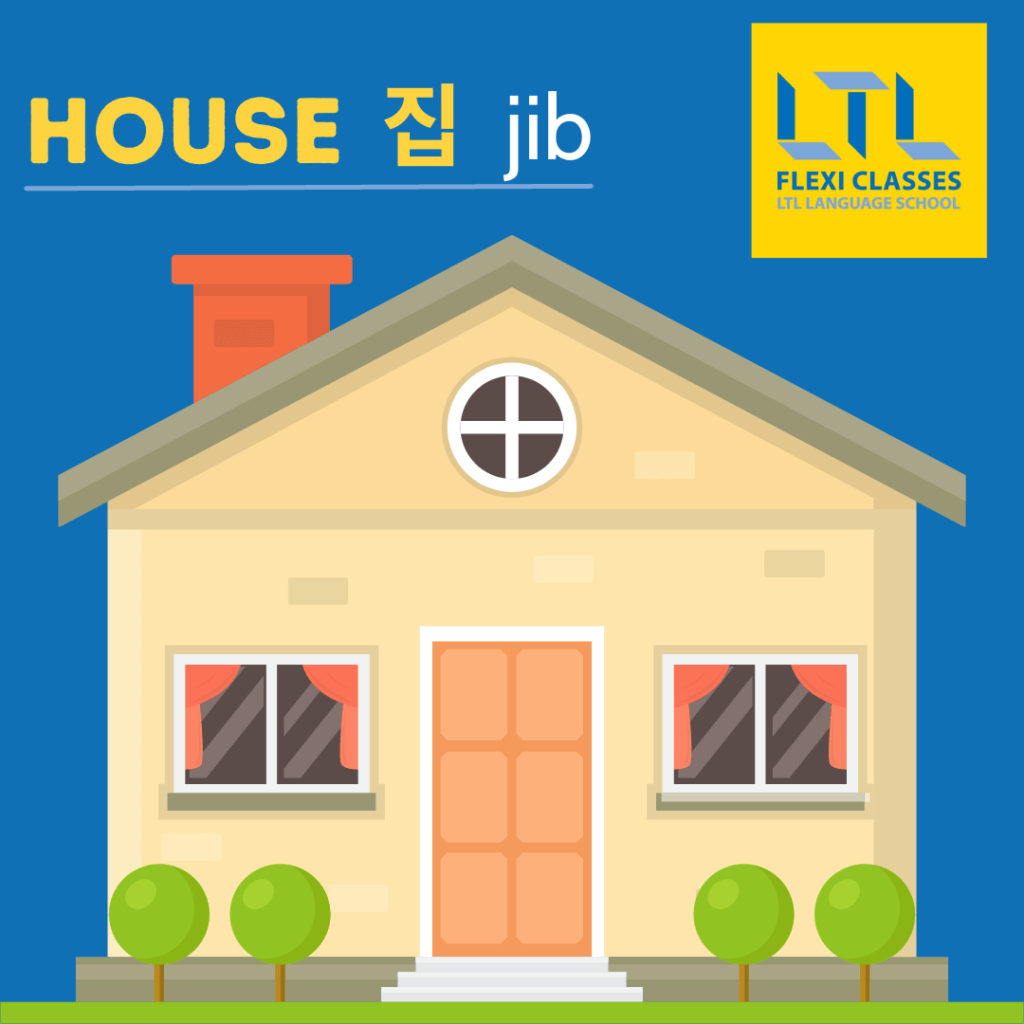
집에 가다Jibe gada
I’m going home
Or, you could ask a friend:
집이야?ji-bi-ya?
Are you home?
Word of caution: when describing your own home, avoid using 제 (je) or 내 (nae) which are usually used to say ‘my’. For houses, it’s much more common to use 우리 (uri). 우리 usually means ‘our’, but in this context is can be used to express ‘my’ home.
우리집Uri jip
My house
Another word use to describe houses in Korean is 댁 (daek). However, this is the honorific form, which means it is a more formal, respectful version of the word used to describe the home of someone senior to you, such as the head of a company or a family elder.
In other words, don’t use 댁 (daek) to describe your own home!

Basic Korean Grammar // The Top 5 Korean Grammar Points for Beginners
You got to start somewhere, right? Our Basic Korean Grammar Guide will help you get started on learning and actually speaking the Korean language.
But, you could use it like this:
여기는 저희 할머니댁이에요.Yeo-gi-neun jeo-hui hal-meo-ni-daeg-i-e-yo
This is my grandmother’s house.
Let’s take a look at some different types of houses in Korean:
| English | Korean | Romanization |
|---|---|---|
| Apartment | 아파트 | Apateu |
| Terraced house | 테라스 하우스 | Teraseu ha-useu |
| Detached house | 단독주택 | Dandok jutaek |
| Countryside house | 시골집 | Sigoljip |
| Dormitory/Student halls | 기숙사 | Gisuksa |
| Guesthouse | 게스트 하우스 | Geseuteu ha-useu |
| Block of apartments | 다세대 주택 | Dasaedae jutaek |

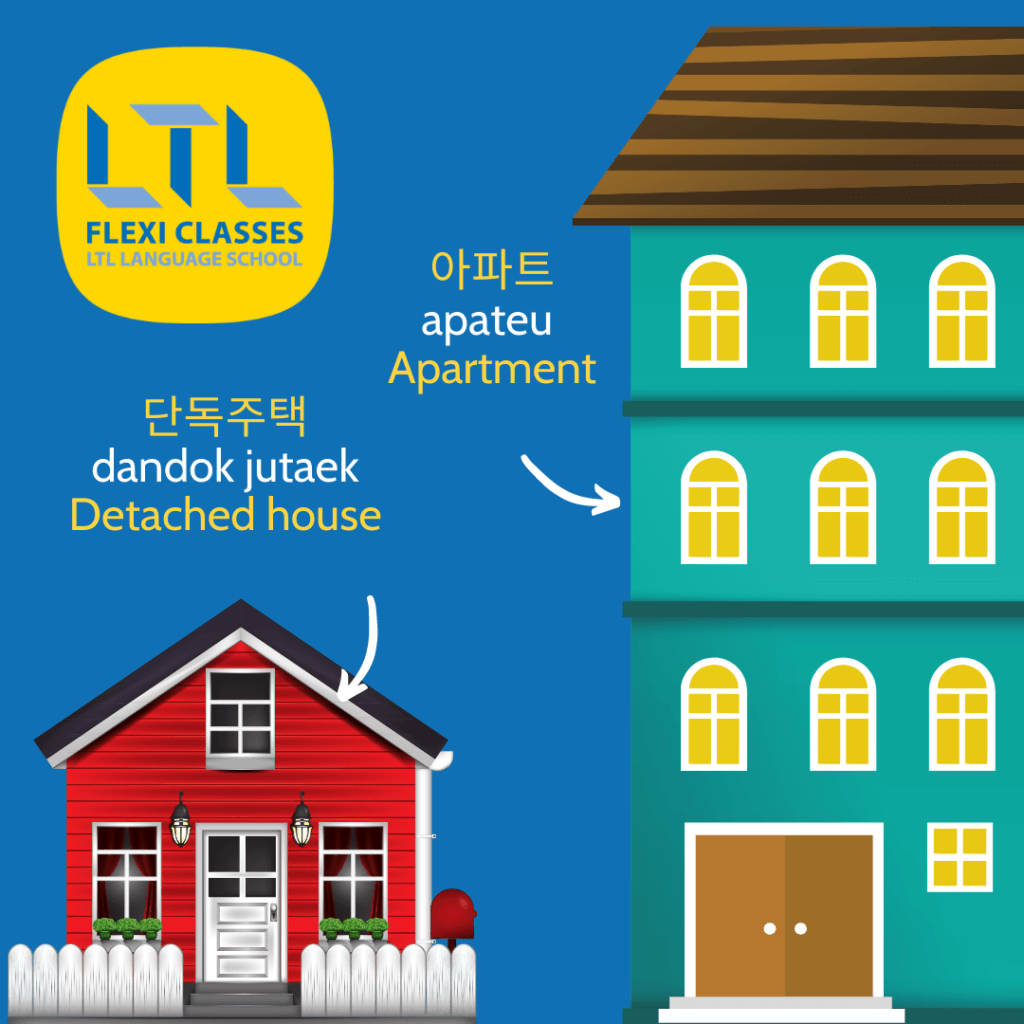
If you’re chatting about houses with your friends in Korea, the conversation may very likely turn to talking about hometowns. The word for this in Korean is 고향 gohyang. For example:
제 고향은 뉴욕시입니다.Je gohyangeun nyuyoksi imnida.
My hometown is New York City.
That being said, we know a lot of you avid language learners like to travel and resettle in other places all over the world. So it’ll definitely help to learn the following two verbs:
Buy a house 집을 사다 jipeul sada
Rent a house 집을 빌리다 jipeul bilrida
Last but not least, we can’t forget about the people who live in your hometown! The word for family is 가족 gajog.
나는 내일 가족을 방문할 것이다.Naneun naeil gajogeul bangmunhal geosida.
I will visit my family tomorrow.
House in Korean || Rooms
So now that you’ve mastered the basics, let’s get into naming separate rooms of the house. You might hear these words pop up a lot in K-dramas, or they might just come in useful when you’ve lost your keys and need to search the house!
Either way, knowing these words is an important step to improving your overall Korean level.
Let’s get started!
| English | Korean | Romanization |
|---|---|---|
| Basement | 지하실 | Jihasil |
| Bathroom | 화장실 (욕실) | Hwa jang sil (Yuoksil) |
| Dining Room | 식당 | Sikdang |
| Bedroom | 침실 | Chimsil |
| Kitchen | 부엌 | Bu-eok |
| Living room | 거실 | Geosil |
| Office | 사무실 | Samusil |
| Downstairs | 아래층 | A rae cheung |
| Upstairs | 윗층 | Witcheung |
| Garage | 주차장 차고 | Juchajang, Chago |
| Study | 서재 | Seojae |
| Staircase | 계단 | Gyedan |
| Garden | 정원 | Jeong-won |
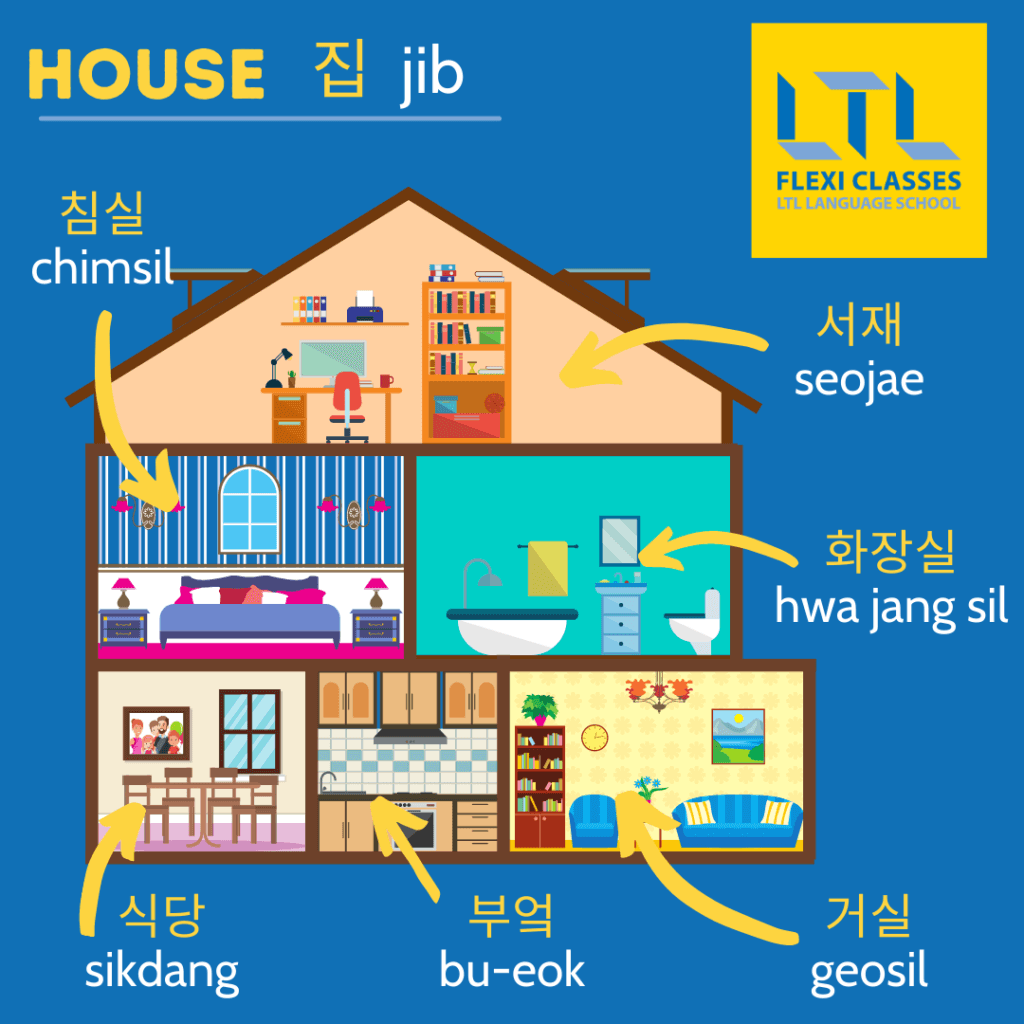
Let’s take a look at some example senteces to put this language into context.
언니는 부엌에 있어요.eonnineun bueok-e iss-eoyo.
My sister is in the kitchen.
내 침실은 위층에 있습니다.nae chimsil-eun wicheung-e itseumnida
My bedroom is upstairs.
House in Korean || Items
So now you get can get around the house and name the different places, it’s time to learn the names of items you’ll find in a house – from the window, to the wall!
| English | Korean | Romanization |
|---|---|---|
| Window | 창문 | Changmun |
| Wall | 벽 | Byeok |
| Bed | 침대 | Chimdae |
| Sofa | 소파 | Sopa |
| Chair | 의자 | Uija |
| Door | 문 | Mun |
| Lamp | 전등 | Jeon deung |
| Oven | 오븐 | Obeun |
| Fridge | 냉장고 | Naeng jang go |
| Microwave | 전자레인지 | Jeonjareinji |
| Kettle | 주전자 | Jujeonja |
| Table | 테이블 | Teibeul |
| Bookshelf | 책장 | Chaek jang |
| Desk | 책상 | Chaek sang |
| TV | 텔레비전 | Tellebijeon |
| Washing machine | 세탁기 | Se tak gi |
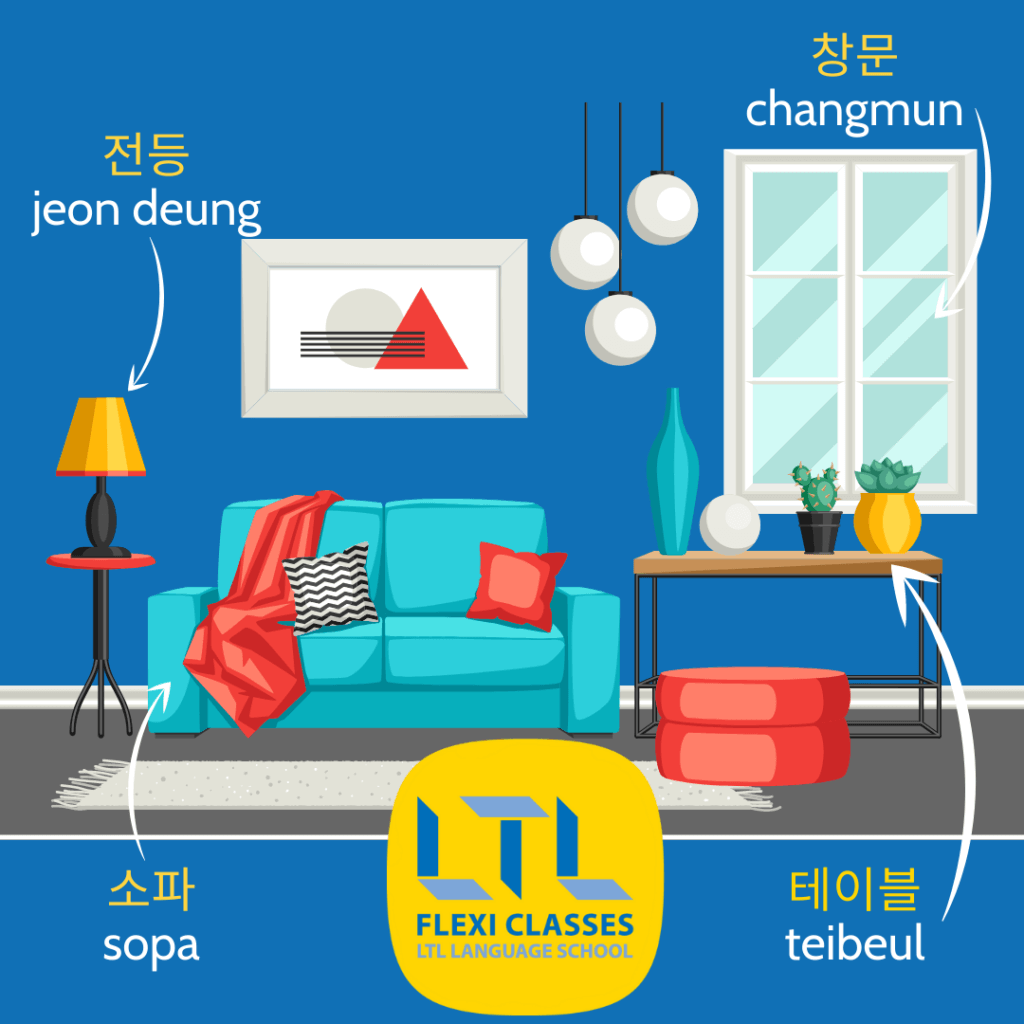
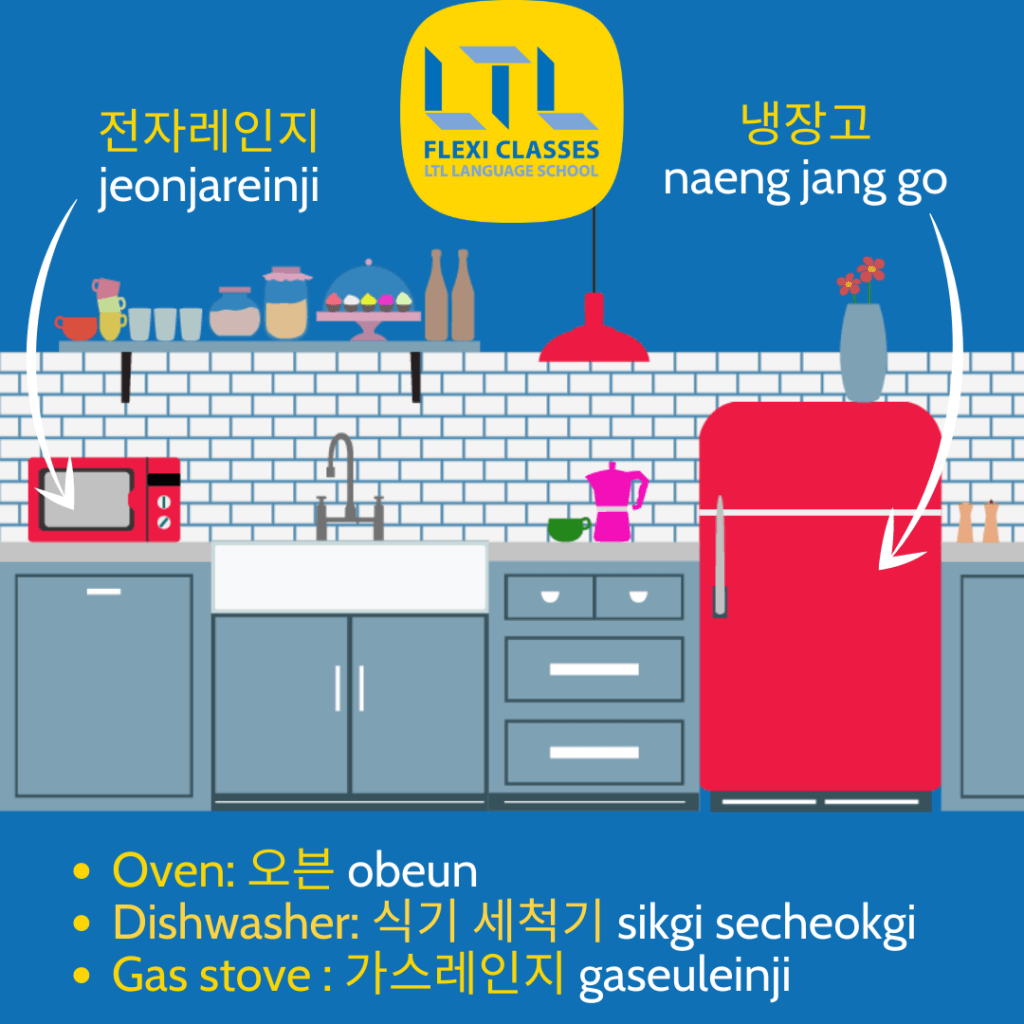
Let’s take a look at some example sentences using these new words:
책상은 침대 옆에 있습니다chaek sang-eun chimdae yeop-e itseumnida
The desk is next to the bed
나는 텔레비전을 보고 싶다naneun terevisoen-eul bogo sipda
I want to watch TV
문을 닫았어?mun-eul dad-ass-eo?
Did you close the door?
House in Korean || Quiz
Ok so now that you’ve gotten familiar with rooms, household objects and common phrases in Korean, let’s put your knowledge to the test!
See if you can answer the following questions:
And if you’re up for one last challenge, try using Korean to answer the following question in our comments section:
당신의 고향은 어디입니까?dangsin-ui gohyang-eun eodiibnikka?
Where is your hometown?

38 Korean Phrases All Beginners Need To Know
Looking for some basic Korean phrases to learn? Check out this article for the most important Korean phrases that will give you a head start.
House in Korean || FAQs
How do you say ‘house’ in Korean?
The most common way to say ‘house’ in Korean is 집 Jip
How to say ‘my house’ in Korean?
‘My house’ in Korean is 우리집 (uri jib), normally 우리 (uri) means ‘our’, but in this context, it can be used to say ‘my house.’
How to say ‘moving house’ in Korean?
In Korean, moving house is 이사 isa.
How can I practice talking about houses in Korean?
You can study and practice Korean with native speakers 24/7 using our online LTL Flexi Classes platform. You can also come to South Korea and take in-person lessons with our highly experienced teachers.
How can I practice talking about houses in Korean?
You can study and practice Korean with native speakers 24/7 using our online LTL Flexi Classes platform. You can also come to South Korea and take in-person lessons with our highly experienced teachers.
Can I experience living with a Korean family?
Absolutely! LTL offers homestay programs for students who’d like to get really immersed in Korean culture and practice their language skills every day.
Want More From LTL?
FANCY LEARNING KOREAN? Check out our online Korean courses here.
We offer a 7-day free trial to all online students where you can study Korean 24/7.
Want to study Korean in Korea instead? Our Korean courses in Seoul can either be taken in small groups of no more than 5 students or individually for a more tailored experience.
We even offer incredible homestay experiences in Seoul too.
To top it all off, it certainly doesn’t end with Korean. Check out the other languages we teach 👇🏻









